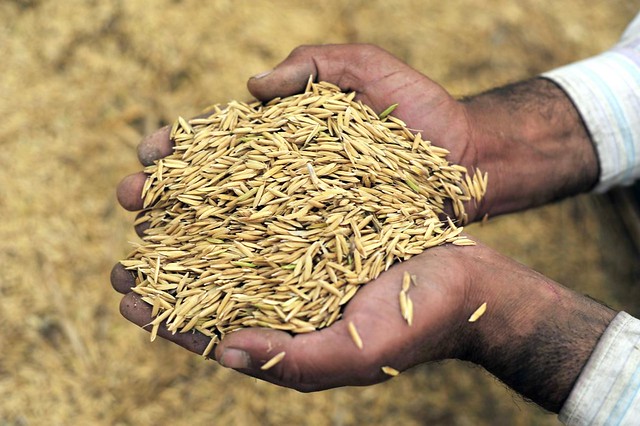 |
| Photo credit: CIAT International on Flickr |
The essence of the Report is in its title: “Wake-up Before It Is Too Late”.
Contributions from 60 leading world experts, including the UN Special Rapporteur on the Right to Food, called for a paradigm shift away from conventional export-oriented, input-intensive, monoculture agriculture and towards “ecological intensification”, small-scale, crop-diverse, local, food production.
At the basis of the Report is the recognition that the 'grow more food' mantra with which the biotech/agrichemical industries have been shaping the regulatory and scientific agenda is wrong. Inescapable evidence is pointing to ecologically-aware farming systems as the only sustainable way forward.
The authors write
“Hunger and malnutrition are mainly related to lack of purchasing power and/or inability of rural poor to be self-sufficient”.On-farm practices must be re-thought. Farmers' role as stewards of the land must promoted: it is farmers who protect all our vital natural resources of soil, water, biodiversity and (because agriculture is the biggest source of greenhouse gases) climate stability.
Also, growing evidence is highlighting the importance of a diverse cropping system in fostering agricultural resilience in the face of natural disasters.
For example, after Hurricane Mitch ravaged Central America, farmers who had adopted sustainable agri-practices retained 20-40% more topsoil and greater soil moisture, and they experienced less economic loss. Increased rotations have been found not only to reduce artificial inputs, but to give yields and profits which are similar or greater than conventional systems (Davis et al.). One US Corn-Belt farmer gave up growing GM crops several years ago: they were damaging his soil, making it so compact that he needed a bigger tractor (using more fuel) to pull equipment across it, and the yield of his non-GM oat crop in the rotation dropped by half. A neighbour warned him he would go broke growing conventional crops, but the farmer hasn't yet seen anything to change his mind.
One contributor to 'Wake-up Before It Is Too Late' pointed out that industrial farming is a poor employer and poor supplier of purchasing power. It offers specialised jobs to the highly-skilled few, and seasonal, precarious jobs to the low-skilled many.
US agro-ecologist, Gary Paul Nabhan, summarised the problems and answers very neatly:
“We have all the knowledge and wherewithal at our disposal, yet severely hampered by the lack of political will and decisive policies, misdirected investments and subsidies, and a narrow focus on inapt technological solutions, not to mention the untoward political influence of agribusiness corporations ... there is remarkable consensus among scientists as well as UN agencies, non-government organisations and other leading commentators that we need an urgent global transition to a small scale sustainable agriculture and localized food systems that can reverse most, if not all, the underlying causes of deteriorating agricultural productivity, conserve natural soil and water resources while adapting to and mitigating climate change. Furthermore, that is also the best strategy for eliminating and alleviating poverty all over the world”.'Wake-up Before It Is Too Late' is an appeal to governments in rich and poor countries alike to renounce their focus on agribusiness and give more support to small-scale, local food production to achieve global food security and tackle climate change.
OUR COMMENT
The UN Report doesn't specifically mention GM crops, but they certainly play a large part in the current high-tech route to catastrophe it identified.If you've been following the Owen Paterson initiative to push the UK into GM crop research with the goal, it seems, of inflicting them on other countries, especially those with small farms in most need of self-sufficiency [see WESTMINSTER ROLLING OUT THE RED CARPET FOR GM - News, July 2013], you'll realise the plan is promoting the exact agricultural model which won't feed the world.
The Westminster Government needs to justify why it's spending your taxes on GM agricultural research. Ask it.
SOURCES:
- Anna Lappé, Wake Up and Smell the Soil! Groundbreaking UN
Report on the Paradigm Shift Needed to Feed the Future, Civil
Eats, 18.09.13
- Claire Provost, Food crisis fears prompt UN wake-up call
to world leaders, Guardian, 18.09.13
- Stephanie Strom, Misgivings about how a weed killer
affects the soil, News York Times, 19.09.13
- Gary Paul Nabhan quoted by Mae-Wan Ho, Towards 100%
Renewables - Surviving Global Warming, Instutute of Science in
Society Report 25.09.13
- Adam S. Davis, et al., 2012, Increasing Cropping
System Diversity Balances Productivity, Profitability and
Environmental Health, PLOS ONE, 7:10
No comments:
Post a Comment
Thanks for your comment. All comments are moderated before they are published.